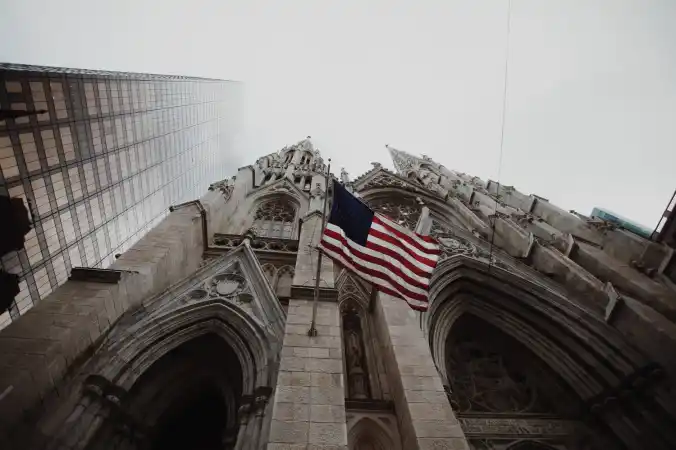Who are you to pass judgment on the servant of another?
It is before his own master that he stands or falls.
And he will be upheld, for the Lord is able to make him stand.
— Romans 14:4 —
On the backside of a Sharp Top Mountain in Southwest Virginia lies the wreckage of World War II vintage air craft. On a training mission in February 1943, five airmen lost their lives as they flew a “low-level nighttime navigational” mission, a mission that ended with tragedy and the debris of a B-25 littered throughout the wooded hillside.
Today, if you leave the trail on Sharp Top and look for the fuselage, engine, wings, and other parts of the crash site, you will find a plaque memorializing the event. On an otherwise unmarked hillside, this memorial is the only sign explaining the mangled metal left standing in the woods. Yet my point in bringing up this piece of atlas obscura is not to focus on the plane crash, but to liken it to the state of our religious liberty today. Today, we can find scattered pieces of religious freedom in our country, but by and large most Christians do not know how they got there, how to assemble them, or how to make them fly. For instance, the recent TGC article undermining the sincerely held beliefs of Christians is a prime example.
In that article, Christian lawyer, John Melcon, explains “Why Your Employer Can Deny Your ‘Religious’ Vaccine Exemption.” In the article, he explained the way “religious exemption laws” work and cited three bad arguments for seeking a religious exemption: (1) personal autonomy, (2) my body is my temple, and (3) abortion complicity. In his estimation, the abortion argument “is perhaps the strongest case,” but by comparison to the welcome use of other drugs (e.g., “Tylenol, Claritin, or their favorite anti-aging skin cream“), he insists that this argument is most likely an example of great inconsistency. (N.B. For a quick response to the Tylenol retort, see this Liberty Counsel post).
In his other two arguments, however, the claim is not inconsistency, but denying that personal autonomy or bodily choice is a truly religious reason for seeking a religious exemption. For Melcon, this leads him to reserve religious exemptions for later, greater threats to the Christian faith. It is this argument that I want to address. Instead of addressing his three examples, which are presented with a striking likeness to someone headed for the Emerald City, I want to consider whether waiting for some later crisis is the best strategy. Even more, I will argue that the increasing statism of our country is coupled with a religious fervor that does not call for patient endurance, but bold witness to the truth.
This Really Is a Religious Liberty Issue
As I have written recently, the presidential mandate for Covid vaccines is one motivated by religious interests. With a religious belief in science, those in power are using the force of the state, the threat of job loss, and the fear of disenfranchisement to coerce public and private employer and employees to get the vaccine. Instead of convincing the public of the vaccines beneficial effects, the state is taking a page from Nike’s playbook coercing people to “just do it.” And sadly, Christians thought leaders are playing right along.
Last week, John Piper made the argument that Christian freedom should lead those who are fearful of getting the vaccine to get the vaccine. But ironically, that fear focused not on the anxiety caused by the adverse effects of the vaccine, or the medical concerns, or the uncertain side effects or long terms effects. The fear focused on those who feel pressured to not get the vaccine. But what group of people is putting fear into the heart of Christians not to get the vaccine? I am sure there could be some, but those individuals do not have the force of the federal government behind them.
In this case, I think Piper is misreading the field. The pressure mounting upon Christians is going in the other directions. And Piper’s article is only, if unintentionally, contributing to that pressure. Still, his article is benign compared to that of John Melcon who calls to question the arguments some are putting forward in an attempt to seek a religious exemption. Indeed, Melcon’s article is one of many Christian hit pieces putting pressure (read: binding consciences ) on those who conscience is bound to not get the vaccine. With sophisticated legal speech, Melcon gives cover for employers and the powers that tax them, as it persuades Christians that it is fool’s errand to seek a religious exemption. But is it? Is it really out of bounds to seek a religious exemption for the Covid mandate? And should we strategize to hold off on seeking a religious exemption now, in order to seek it later?
I wouldn’t be writing this article, unless I disagreed. And I am not the only one. In a short string of tweets, lawyer, professor, and ERLC legal fellow Sam Webb had a few things to say in response to Melcon’s article. Stripping out the Twitter formatting, here’s what he said in response:
Article XVI of the New Hampshire Confession—a Baptist confession used 150+ years—states: “We believe that civil government is of divine appointment, for the interests and good order of human society, and that magistrates are to be prayed for, conscientiously honored, and obeyed, except only in things opposed to the will of our Lord Jesus Christ, who is the only Lord of the conscience, and the Prince of the kings of the earth.”
If a Christian who holds no settled convictions against this Confession … cannot in good conscience—or, put differently, in good faith—submit to a government-mandated, employer-enforced vaccination because that Christian believes such mandate, action, or vaccination is “opposed to the will of our Lord Jesus Christ”for any number of reasons, then such objection is, in fact, a sincerely held religious belief and an exemption is warranted.
To cause such Christian to act contrary to conscience—even if ill-formed conscience!—is to claim lordship over the conscience which is further violation of that Christian’s sincerely held religious belief that “Jesus Christ…is the only Lord of the conscience.” Even more, what cannot be done in good faith is sin (Rom. 14:23) and so to force vaccination against conscience is to cause sin.
Let’s end the crusade of binding the consciences of brothers and sisters in Christ on disputable matters and let’s love our neighbor by advocating for the freedom of conscience—even if we disagree with the exercise of such conscience.
This is the exactly right! As I have counseled and signed off on multiple religious exemptions, I have not necessarily agreed with every one of the arguments being made, but I have, after listening to the formulation of the believer’s argument, perceived what their sincerely held, biblically-informed belief is. And because of that recognition of sincerely held beliefs, I have supported those Christians who have put their livelihoods in jeopardy in order to follow their Lord. I have urged them to count the cost, but I have not tried to shame them or bind their conscience. This, after all, is what Romans 14:4 calls us to do, and this is what John Melcon has failed to do.
Let’s end the crusade of binding the consciences of brothers and sisters in Christ on disputable matters and let’s love our neighbor by advocating for the freedom of conscience—even if we disagree with the exercise of such conscience.
With no appreciation for how Romans 14 works or any concern that he might be binding his brother’s conscience, Melcon’s argument results in a pressuring Christians to drop their sincerely held beliefs, because after all, it hurts the rest of us. Unfortunately, this is the same logic that governments are rolling out in this country and across the world (think Australia): “You need to think of the collective good and stop resisting on personal grounds. After all, there is no religious reason not to get the vaccine. It’s just medicine.”
For those who are most sensitive to the issues of religious liberty, however, all coercive arguments will fail. And should fail. As Lutheran writer Matthew Cochrane has observed, “Our government has forgone convincing us and has instead resorted to bullying, censorship, abuse, and coercion. But threats and propaganda do not absolve us of the God-given responsibility to make our best judgment based on the information available to us—even the information government bureaucrats, Big Tech, and corporate interests hide because it casts reasonable doubt on the vaccines.” And unfortunately, many Christian leaders are not far behind them in their tactics or persuasion. And this, I believe, is because they don’t see the bigger picture.
The Bigger Picture: Our Secular State Is Not Irreligious
What’s the bigger picture? Namely, the way that the vaccine mandate—not the vaccine qua vaccine, i.e., the vaccine as a medical prophylactic—is a religious sacrament and a by-product of America’s growing statism.
For the last decade, Charles Taylor’s magnum opus, A Secular Age, has been a constant reference for understanding the “immanent frame” of our world. The Gospel Coalition even published a book in Taylor’s honor, and for good reason. Taylor, in his terminology, has explained how the secular world has lost its sense of divine transcendence and God’s place in our world. Accordingly, the modern secularism has made it is easier to disbelieve than to believe. Whereas Christendom explained the world in spiritual terms and religious practices, the five hundred year project which resulted in today’s secularism has left a vacuum where God once stood.
Christians know that God is not absent. As Francis Schaeffer put it, he is there and he is not silent, but in today’s naked public square, arguments for God are not permitted and this partially explains why religious exemptions are not appreciated. It was a different day when the language of the first amendment was penned. At that point, religion still possessed honor as a civic good. Today, however, religion, and especially Christianity, is seen as a nuisance and a source of bad behavior. This is why the Equality Act and SOGI policies are on a collision course with Christianity. Sexual liberty has become the new religion and that means that religious protections are now being transferred from people of faith to their secular offspring.
If we are to enjoy any religious liberty going forward, we cannot take a strategy that waits for worse cases to arise.
This is also why Melcon makes the case the way he does. He thinks that by playing our religious exemption card later in the game we will be better off. But what he doesn’t consider—in addition to binding consciences—is the fact that the government is not a religiously neutral or interested in well-timed religious liberty. Rather, it is actively carrying out a religious crusade, albeit one that speaks with scientific and not sacred speech. This is the point that needs to accompany Taylor’s observations. Our world has not only adopted a secular worldview, but in the absence of Christianity, and its secular offspring (i.e., civil religion), secular individuals have deified the state to celebrate and support their hedonistic desires. As Zygmunt Bauman has noted in his book Liquid Life, modernity is not only “presented as a time of secularization (‘everything sacred was profaned,’ as young Marx and Engels memorably put it) and disenchantment.” It is also a time where the enlarging state has adopted and enforced religious values. He continues,
What is less often mentioned, however, though it should be, is that modernity also deified and enchanted the “nation,” the new authority—and so by proxy the man-made institutions that claimed to speak and act in its name. “The sacred” was not so much disavowed as made the target of an “unfriendly takeover”: moved under different management and put in the service of the emergent nation-state. (Bauman, Liquid Life, 44; cited in Peter Leithart, 1 and 2 Kings, 64)
This is what most of our Christian leaders have not sufficiently appreciated. With the election of Joseph Biden, we have seen an unending array of executive orders and economic decisions that have further tied the citizens to the state (think: government bailouts) and forced the state on the citizens (think: all the policies of the CDC). Topping the list of government intrusions is the vaccine mandate. And because this mandate have come with all the trappings of a religion, we now have a state that is forcing its religion on its citizens.
No Religious Liberty Without Liberty of Conscience
If you don’t see how the secular state is instantiating its religious point of view, I encourage to open your eyes. Again, I have outlined this point in a previous article. For now, let me simply connect the dots from religious liberty to liberty of conscience.
Returning to the wreckage on Sharp Top Mountain, we should consider that it would be impossible to know what it was or why it was there without a memorial explaining the crash. Such is the case with religious liberty as well. Many can see the fuselage, the wings, and the engines of religious liberty scattered throughout our country. But very few can put all the pieces together and understand how it works and how it got here.
How many who have read the Bill of Rights, if they have read the Bill of Rights, know what it took for James Madison and the Founding Fathers to make a place for religious liberty? How many critique a religious exemption understand the connection to Romans 14? Evidence for our inability to understand Romans 14 has been seen for the last year. Too many evangelicals have interpreted Romans 13 as a divine imperative to do whatever the government tells you, without considering first who gives the government their authority. Then, interpretations of Romans 14 continue in confusion, because Christians are not trying to protect their brothers freedom. In Melcon’s case, he is (unintentionally) siding with the state to bind other’s freedom. And why? Because now is not the time to raise religious concerns.
All in all, we have lived off the rations of religious liberty for nearly two and half centuries, and it is time to relearn how all the pieces got there and how to reassemble them so that that religious liberty might fly again. Unfortunately, arguments like the one offered by John Melcon and John Piper and countless other Johns demonstrate that even the most lucid among us still don’t quite know how this thing flies.
If we are to enjoy any religious liberty going forward, we cannot take a strategy that waits for worse cases to arise. Rather, we need to reintroduce, rewaken, and reinforce the arguments for religious liberty. This must be done in the public square and in countless conversations with Christians and their neighbors. In fact, this is one of the growing benefits of the religious exemptions. In our local church alone, I can report countless opportunities Christians have taken to share the gospel and their religious convictions about the vaccine.
And you know what? It has had effect, not just on other Christians, but on atheists, and agnostics who have seen the merit of personal liberty of conscience and the demerit of forcing people to get a vaccine against their will. This is what it will take for religious liberty to gain a hearing in public, as well as Christians being willing to suffer for their beliefs. This is what turned James Madison’s heart, when he saw the six Baptist pastors jailed for their faith. And this is likely what will turn other hearts today, witnessing people willing to suffer for the sake of conscience.
Yet, such conversations and suffering will not come if we continue to bind the consciences of other Christians. And this is the other place we need to talk about religious liberty: in the church.
In the church, we need to encourage Christians to form their consciences around God’s Word. But we must also permit Christians to form their consciences differently. When we fail to do that, however, we fail to follow Romans 14, and we further fracture the witness of the church, not to mention hurting individual members who are trying their best to follow God with all their heart.
We must make biblical arguments on the subject, learning afresh how Christians have resisted tyranny, so that we can recognize and resist tyranny in the present.
In such cases, the path of another might not be your path, but it is the path that some servants of the Lord have taken and will take. And in that time, we should as Sam Webb put it, “end the crusade of binding the consciences of brothers and sisters in Christ on disputable matters and let’s love our neighbor by advocating for the freedom of conscience—even if we disagree with the exercise of such conscience.”
This is what Melcon’s argument does not do. It may understand the legal ramifications of religious exemptions and it purports to know what will happen if people seek them. But it does not demonstrate an appreciation for liberty of conscience itself. And the point I am making is that if we are going to see religious liberty in public, it will require the church in America to grow up in its understanding of liberty of conscience among its own members. This means pastors teaching on the subject, Christians standing firm for the truth, and other Christians—whether they share the same conviction about Covid vaccines or not—supporting others who are willing to suffer for their beliefs. Indeed, there have been many Christians in church history who have held different beliefs on different Christians practices. But one thing that has benefitted the Church in America has been the freedom to exercise their religion without the coercion of the state.
Today, with the state taking on its own religious practices, we are not in a place where we can wait for a better time to exercise what remains of our religious liberty. No, teaching the church and our neighbors how to recognize the scraps of religious liberty is where we must begin. We must make biblical arguments on the subject, learning afresh how Christians have resisted tyranny, so that we can recognize and resist tyranny in the present. Indeed, now is the time for us to connect religious liberty with liberty of conscience, and to stop making arguments that aid the state by leading Christians to sin as they ignore their consciences.
If we fail to do that now, we will have little hope of standing later. And for that reason, for those who are standing up and submitting religious exemptions, we need to pray for them and promise them that we will hold them up as they follow their Lord and our Lord—whether or not they are doing it in the same ways that we would. Such is the way of liberty of conscience and the way Christians need to truly affirm the faith of their brothers and sisters.
Soli Deo Gloria.




























